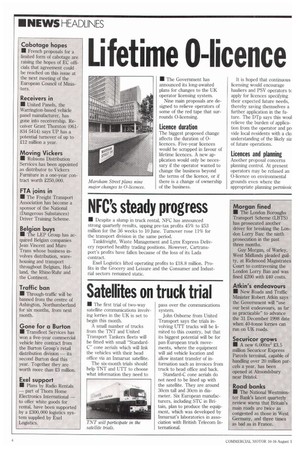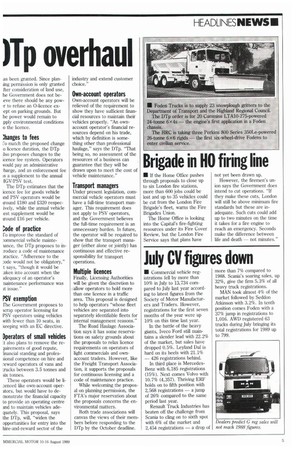Lifeti e 0-licence ffp overhaul
Page 6

Page 7

If you've noticed an error in this article please click here to report it so we can fix it.
• The Government has announced its long-awaited plans for changes to the UK operator licensing system.
Nine main proposals are designed to relieve operators of some of the red tape that surrounds 0-licensing.
Licence duration
The biggest proposed change affects the duration of 0licences. Five-year licences would be scrapped in favour of lifetime licences. A new application would only be necessary if the operator wanted to change the business beyond the terms of the licence, or if there is a change of ownership of the business. It is hoped that continuous licensing would encourage hauliers and PSV operators tt apply for licences specifying their expected future needs, thereby saving themselves a further application in the future. The DTp says this woul relieve the burden of application from the operator and pi-4 vide local residents with a cle; understanding of the likely siz of future operations.
Licences and planning
Another proposal concerns planning control. At present operators may be refused an 0-licence on environmental grounds even where the appropriate planning permissic
as been granted. Since planing permission is only granted fter consideration of land use, he Government does not beeve there should be any powa." to refuse an 0-licence exept on parking grounds. But he power would remain to ipply environmental conditions
o the licence.
:hanges to fees ['o match the proposed change o licence duration, the DTp Lisa proposes changes to the icence fee system. Operators vould pay an administrative :barge, and an enforcement fee is a supplement to the annual -IGV/PSV test.
The DTp estimates that the icence fee for goods vehicle nd PSV operators would be iround 2180 and 2320 respecively, while the annual vehicle .est supplement would be iround 216 per vehicle.
Code of practice
To improve the standard of ommercial vehicle maintelance, the DTp proposes to in:roduce a code of maintenance ractice. "Adherence to the r;ode would not be obligatory," t says, "though it would he .aken into account when the adequacy of an operator's maintenance performance was at issue."
PSV exemption
The Government proposes to scrap operator licensing for PSV operators using vehicles with fewer than 10 seats, in keeping with an EC directive.
Dperators of small vehicles It also plans to remove the reiuirements of good repute, financial standing and professional competence on hire and reward operators of vans and trucks between 3.5 tonnes and six tonnes.
These operators would be lienced like own-account operators, but would have to demonstrate the financial capacity to provide an operating centre and to maintain vehicles adequately. This proposal, says the DTp, will, "widen the opportunities for entry into the hire-and-reward sector of the industry and extend customer choice."
Own-account operators
Own-account operators will be relieved of the requirement to show they have sufficient financial resources to maintain their vehicles properly. "An ownaccount operator's financial resources depend on his trade, which by definition is something other than professional haulage," says the DTp. "That being so, no assessment of the resources of a business can guarantee that they will be drawn upon to meet the cost of vehicle maintenance."
Transport managers
Under present legislation, commercial vehicle operators must have a full-time transport manager. This requirement does not apply to PSV operators, and the Government believes the full-time requirement is an unnecessary burden. In future, the operator will be required to show that the transport manager (either alone or jointly) has continuous and effective responsibility for transport operations.
Finally, Licensing Authorities will be given the discretion to allow operators to hold more than one licence in a traffic area. This proposal is designed to help operators "whose fleet vehicles are separated into separately identifiable fleets for internal management reasons."
The Road Haulage Association says it has some reservations on safety grounds about the proposals to relax licence requirements on operators of light commercials and ownaccount traders. However, like the Freight Transport Association, it supports the proposals for continuous licensing and a code of maintenance practice.
While welcoming the proposal on planning permission, the FTA's major reservation about the proposals concerns the environmental matters.
Both trade associations will canvas the views of their members before responding to the DTp by the October deadline.


































































































































